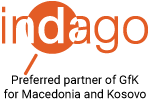Quantitative Research
Measuring patterns, trends, and drivers at scale
Quantitative research allows organizations to measure attitudes, behaviors, and experiences across large populations with statistical reliability. It is used to test hypotheses, track change over time, and support evidence-based decisions.
This type of research helps you answer:
-
How widespread is a behavior, perception, or issue?
-
Which factors influence decisions or outcomes?
-
How do results differ across segments or regions?
-
Is change occurring over time?
Our approach
Indago designs statistically robust studies with careful sampling, questionnaire design, and quality control. We go beyond topline numbers by interpreting results in context and translating them into practical implications.
Methods include:
-
Face-to-face (CAPI) and telephone (CATI) surveys
-
Online surveys
-
Probability and non-probability sampling
-
Advanced data analysis, weighting, and segmentation


Qualitative Research
Understanding motivations, meanings, and lived experiences
Qualitative research explores the why behind numbers. It provides depth, context, and understanding of how people think, feel, and make decisions — especially when issues are complex or sensitive.
This type of research helps you:
-
Understand motivations, beliefs, and barriers
-
Explore social norms, stigma, and perceptions
-
Generate insights for communication, policy, or program design
-
Interpret and enrich quantitative findings
Our approach
We conduct qualitative research with a strong emphasis on trust, ethical engagement, and skilled moderation. Our analysis focuses on identifying patterns, narratives, and actionable insight — not just quotes.
Methods include:
-
Focus group discussions (FGDs)
- In-depth interviews (IDIs)
- Participatory and community-based methods
-
Qualitative thematic analysis
User Experience
Designing services and products around real user needs
User Experience research helps organizations understand how people interact with products, services, and digital platforms — and where friction, confusion, or unmet needs exist.
This research helps you:
-
Improve usability and accessibility
-
Identify pain points in user journeys
-
Test concepts, interfaces, or service flows
-
Design solutions that reflect real user behavior
Our approach
Indago combines behavioral insight with practical UX methods. We observe, test, and analyze real user interactions, translating findings into clear design and service recommendations.
Methods include:
-
Usability testing
-
User journey mapping
-
Task-based testing
-
Interviews and observation


Quality of Service
Measuring service performance from the user’s perspective
Quality of Service research assesses how services are experienced by users — not just how they are designed or intended to function.
This research helps you:
-
Measure satisfaction and perceived quality
-
Identify service gaps and bottlenecks
-
Compare performance across locations or providers
-
Inform service improvement and accountability
Our approach
We focus on the full service experience, combining quantitative indicators with qualitative feedback. Results are linked directly to operational and strategic improvements.
Methods include:
-
Customer / beneficiary satisfaction surveys
-
Service quality assessments
-
Mystery shopping (where applicable)
-
Experience-based indicators and scoring



